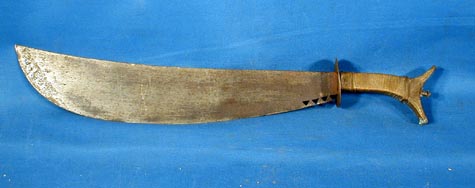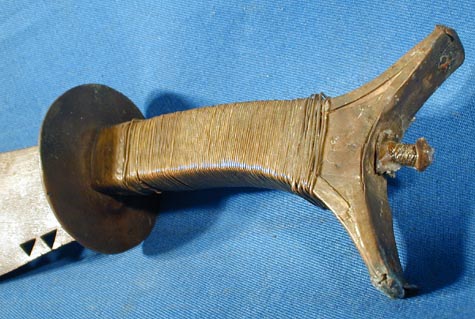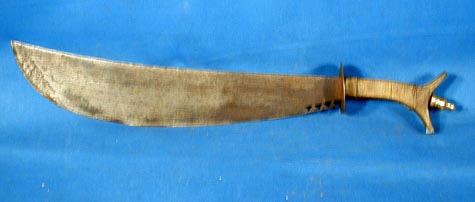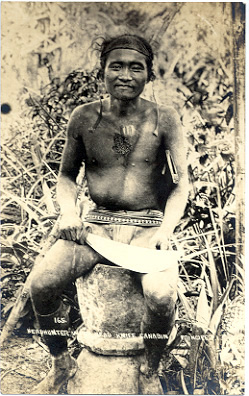
 |
|
|
|
|
#1 |
|
Member
Join Date: Dec 2004
Location: Austin, TX
Posts: 15
|
I've run across a couple of these bolo - preliminary identification is/was Mandaya, but now that there have been more Mandaya items recently discussed here I don't think that's correct. It's a rather distinctive style -
   Tom Hyle found this new example. Here's one I had in my collection a couple of years ago, it went as a gift/swap to Conogre (who may still have it, I'm not sure):   Gotta love eBay seller ingenuity - when I found the Conogre chopper it had a bowling trophy finial on the tang spike:  We think this is the "original owner":  Any ideas on who/when/where? |
|
|

|
|
|
#2 |
|
Vikingsword Staff
Join Date: Dec 2004
Location: The Aussie Bush
Posts: 4,194
|
.. IMHO. The full tang construction and T-hilt is unlike anything from the Phils: northern, central or southern. Also, does not fit Borneo.
My inclination is Central or South America for several reasons. First the picture with the maddeningly unreadable inscription (can you get a better image, Hal?) -- I can make out HEADHUNTER ..... KNIFE CANA.. (or CAHA.. or CAMA..) ..... The guy in the picture does not look like anyone from SE Asia -- wide nose, thin well demarcarted lips, round face -- and the tattooing on the chest is something I have not seen anywhere in Asia, even in New Guinea, Borneo, etc. The scabbard construction, with its particular style of rattan binding, is also not reminsicscent of anything I've seen in SE Asia. And the shape of this knife is quite similar to some of the machetes from Latin America. That's my best guess. Be very surprised if the guy and his bolo turn out to be SE Asian.  Ian. This is the best I can manipulate the inscription on the photograph above. Last edited by Ian; 27th January 2005 at 11:40 PM. |
|
|

|
|
|
#3 |
|
Member
Join Date: Dec 2004
Location: Austin, TX
Posts: 15
|
My inclination is Central or South America for several reasons. First the picture with the maddeningly unreadable inscription (can you get a better image, Hal?) -- I can make out HEADHUNTER ... KNIFE CANA.. (or CAMA..) ...
From the date on my copy of that picture, I found it sometime before December 2000. I just dug around in my "armor_images" folder, looking at earlier dates, but couldn't find a larger original. I may have to start looking through old CD backups .... Here's a few more pictures of the Tom chopper:  Loose brass guard - for a moment, I toyed with the idea that this was a seppa (washer) from a Japanese sword, but the hole the tang mounts through is rectangular and not triangular as found on seppa.  Another view of the grip/pommel.  Gimping on back edge There's a tiny museum/collection label with faded ink on the back of the scabbard that reads: "Phillipine (47)" |
|
|

|
|
|
#4 |
|
EAAF Staff
Join Date: Dec 2004
Location: Louisville, KY
Posts: 7,217
|
For me that is as Filipino as my sgian dubhs.

|
|
|

|
|
|
#5 |
|
Member
Join Date: Nov 2004
Location: USA
Posts: 1,725
|
The lines on the spine are similar to those found on some dha and other SEA weapons.
|
|
|

|
|
|
#6 |
|
Member
Join Date: Dec 2004
Location: Houston, TX, USA
Posts: 1,254
|
The lines on the spine and the "okar" at the front of the blade base are things I've encountered only in SE Asia. Berber and Celtic spine markings are not the same.
The blade shape is identical to the simpler of the Mandaya/Manobo pieces we've been seeing, except (big exception, I know, but big similarity, too) lacking a ricassoe (angled or otherwise). The hilt shape is markedly similar to Mandaya daggers. The man's nose looks Malay to me. Those are some Asian looking eyes, too. Not saying you don't see these features on S Americans, but sure looks plenty Malay (etc.) to me. Check his belt and ear-rings; what was that "fashion sense"? Those may be our clues. Aside from weight, these are markedly similar to Collins 1005, which is generally said to be copied from a PI "bolo" (tenuous, I know; just covering bases). Blade is similar to machete, or parang nabur. The hilts on both are covered in brass/copper sheeting, for whatever that means. Hilt section is rectangular, with fairly sharply defined edges. No buttspike on mine; how sure are we that's tang, anyway? What's the coresponding feature on a Mandaya dagger? Tang? Blade is folded steel. End of handle can be seen through large guard hole (remember the wiggle?) looks porous; could it be antler? Rattan? The rattan bindings on sheath and hilt look SE Asian to me; why not to you? In any event, neither is original, though both are old. That's some kind of old (adhesive?) paper/tape down the edges of the sheath. The criss-crossing of the overbinding (repair? joining method for a talismanic cloth?) particularly reminds me of Moro handle wraps. How 'bout that red cloth? A small piece of a different old red cloth came tied to the sheath. Blade is light and thin, with, as I recall, a humped wedge section. Sheath is made in two shells in ordinary fashion; only the long, non-hollow "tail" is one-sided. Sheath has remains of/biniding site for three or four rattan suspension-loops. I see the mouth of the sheath under his left armpit. Last edited by tom hyle; 28th January 2005 at 03:38 PM. |
|
|

|
|
|
#7 |
|
Member
Join Date: Mar 2006
Posts: 6
|
The photograph is definately of an Ilongot man. The blade and scabbard also look Ilongot, but often the scabbard is decorated with tiny cerated pendants of mother of pearl. There is a drawing in one of the Renato and Michelle Rosaldo books, as well as the Laurence Wilson book "Ilongot life and legends".
|
|
|

|
 |
|
|